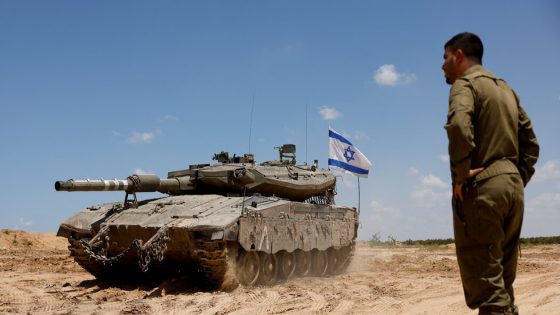President Biden paused an arms shipment to Israel last week to prevent the U.S.-made weapons from being used in a long-threatened assault on the city Rafah, administration officials said on Tuesday night, a sign of the growing rift between Washington and Jerusalem over the conduct of the war.
The president withheld 1,800 2,000-pound bombs and 1,700 500-pound bombs that he feared could be dropped on Rafah, where more than one million Gazans have taken refuge, the officials said. The administration is reviewing whether to hold back future transfers, including guidance kits that convert so-called dumb bombs into precision-guided munitions.
The decision to delay the delivery of the 3,500 bombs was the first time that Mr. Biden has used his power to curtail arms as an instrument to influence Israel’s approach to the war since the Oct. 7 Hamas-led terrorist attack. A number of Mr. Biden’s Democratic allies in Congress have for weeks urged him to limit or halt arms shipments to Israel, something he had refused to do until now because of his strong support for the war against Hamas.
Israeli officials disclosed the weapons pause to Axios earlier this week, but U.S. officials refused to confirm it either at briefings or privately until Tuesday night. The fact that they finally did so was a clear indication of how much frustration is growing among administration officials that their Israeli counterparts are not heeding U.S. warnings against a major operation in Rafah that could lead to extensive civilian casualties. Confirmation of the arms pause came just hours after Israel sent tanks into the city in southern Gaza.
One U.S. official said the administration began reviewing arms shipments last month when it became clear that Israel seemed to be reaching a decision on a Rafah operation. Mr. Biden initially took the position that Israel should not attack Rafah without a plan to effectively minimize civilian casualties, but in recent weeks the White House has increasingly indicated that it did not believe such a plan was even possible.
Israel has not made clear whether it is on the verge of opening the assault on Rafah but has taken actions in the last couple of days that seemed to hint it was moving in that direction. Israeli forces ordered the evacuation of 110,000 civilians from Rafah and mounted airstrikes against targets on the border areas of the city in response to Hamas rockets that killed four Israeli soldiers over the weekend.
Israel called the entry of tanks into Rafah and seizure of the city’s border crossing with Egypt on Tuesday a limited operation to eliminate Hamas fighters and infrastructure tied to the rocket attack. The actions did not appear to be the vanguard of the larger attack Israel has promised. But the evacuation order and limited military moves appeared intended to keep pressure on Hamas while negotiators meet in Cairo to discuss a possible cease-fire agreement.
Mr. Biden made no mention of his decision to withhold the bombs during a speech earlier Tuesday at a Holocaust remembrance ceremony at the Capitol, but repeated his support for Israel. “My commitment to the safety of the Jewish people, security of Israel, and its right to exist as an independent Jewish state is ironclad even when we disagree,” he said.
The administration is neither halting all weapons to Israel nor, at this point, permanently withholding the bombs at issue. In fact, officials said the administration had just approved the latest tranche of aid amounting to $827 million of weapons and equipment. The administration intends to send “every dollar” of the money just appropriated by Congress, the officials said.
But they said they were especially worried about the damage that could be done by the 2,000-pound bombs in a dense urban area like Rafah with so many displaced civilians.
Source Agencies



